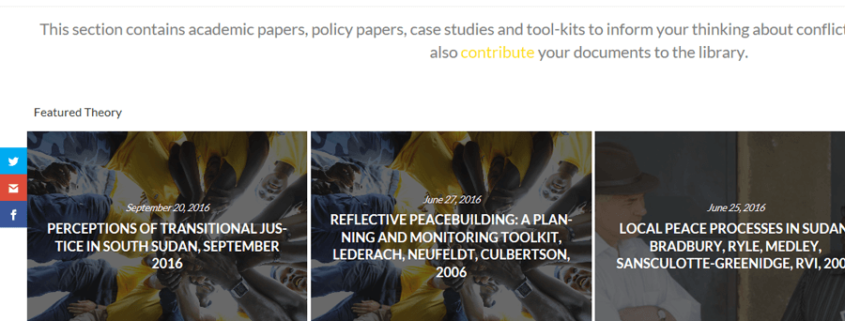This weekly review highlights and analyses the contentious issues in the partially signed peace agreement (2015) and suggests a number of options.
repository
CSRF Research Repository
The CSRF Research Repository aims to support greater contextual knowledge for policy makers, programme managers, and implementers by providing a searchable repository of research, analysis, and resources, and providing periodic updates on new research and analysis.
This report maps out the corruption and the conflict-financing system in South Sudan and describes the likely channeling of illicit money flows. The primary goal of this report is to focus on the mechanics of the system, rather than specific individuals or their networks of facilitators and enablers. Download
The newest state in the Horn of Africa has become an arena where powerful neighbours manoeuvre for regional influence. The deteriorating security situation in oil-rich South Sudan took neighbouring states by surprise, but they have risen to the opportunities the situation offers. Uganda and South Sudan, Ethiopia and Eritrea, Kenya and Egypt support different proxies and their competition could plunge the region into chaos. As South Sudan struggles with a military and political crisis, the…
This paper evaluates the extent to which the environmental provisions of the South Sudanese Petroleum Act (2012) have been enforced, and attempts to identify the gaps and challenges facing the implementation. To determine the level of enforcement, the Sudd Institute conducted structured interviews with key officials from the ministries of Environment and Petroleum and Mining and Nile Petroleum Corporation.
This paper explores the role of the Ugandan Forces and International Commitment in the ongoing armed conflict in South Sudan. Download
This paper is based on a preliminary exploration of local representation in the Bor County Land Authority (CLA) in South Sudan. CLAs were set up with the mandate to represent rural communities and incorporate local concerns in land matters. The study explored the means of CLA authorization, communicative interactions, and the extent of downward accountability. Download
This analysis summarizes findings from conflict analyses undertaken as part of the UNICEF Peacebuilding, Education and Advocacy (PBEA) Programme, funded by the Government of the Netherlands. The purpose of the report is to create actionable recommendations for the education sector in South Sudan to inform and shape peace consolidation and nation building. The analysis points out some of the key challenges of the South Sudan’s education system that pertain to massive gaps in service delivery,…
As South Sudan emerges from the immediate aftermath of conflict, the task of strengthening government capability, particularly in the core civil service, will be essential to facilitating economic development and ensuring the basic social services the population needs to construct the new country’s future. This note brings an outside perspective to those challenges. It identifies key short-and medium- term bottlenecks to building civil service capacity and, drawing on experience with similar problems elsewhere, raises policy…
This meeting report is the record of an event on South Sudan: Beyond the ceasefire held on 27 February 2015 by the Rift Valley Institute Nairobi Forum. It refers to different key conflict dynamics such as power struggles, lack of accountability and patronage.
By looking at the war in Jonglei, this report explains the wider constellation of regional and national challenges to peace and patterns of war. Download

Pages
- About Our County Profiles
- Blog
- Case Studies Grid
- Central Equatoria
- Conflict Sensitivity Resource Facility South Sudan
- Contact Us
- Contribute a Repository Article
- County Profile HTML links
- County Profiles
- COVID-19 HUB
- Covid-19 information page
- CSRF About Us
- CSRF Helpdesk
- CSRF Helpdesk Form
- CSRF Login
- Dashboard
- Deliverables
- Demo
- Events
- Forgot password
- Guides, Tools and Checklists
- Helpdesk
- Home
- Latest
- Looker Studio
- Subscribe

